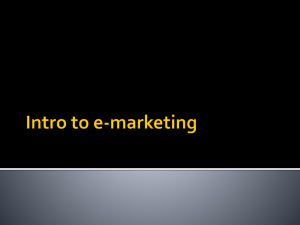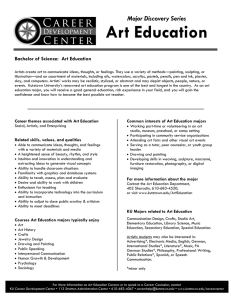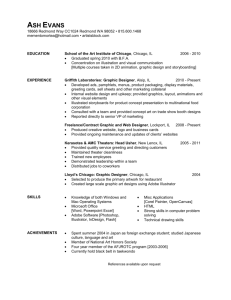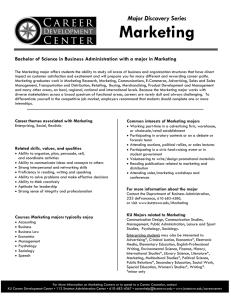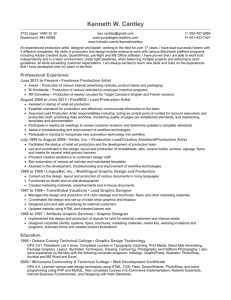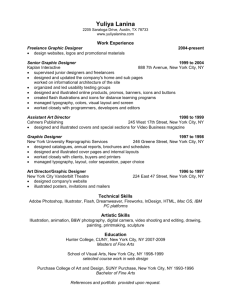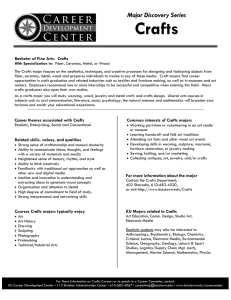Communication Design Major Discovery Series
advertisement
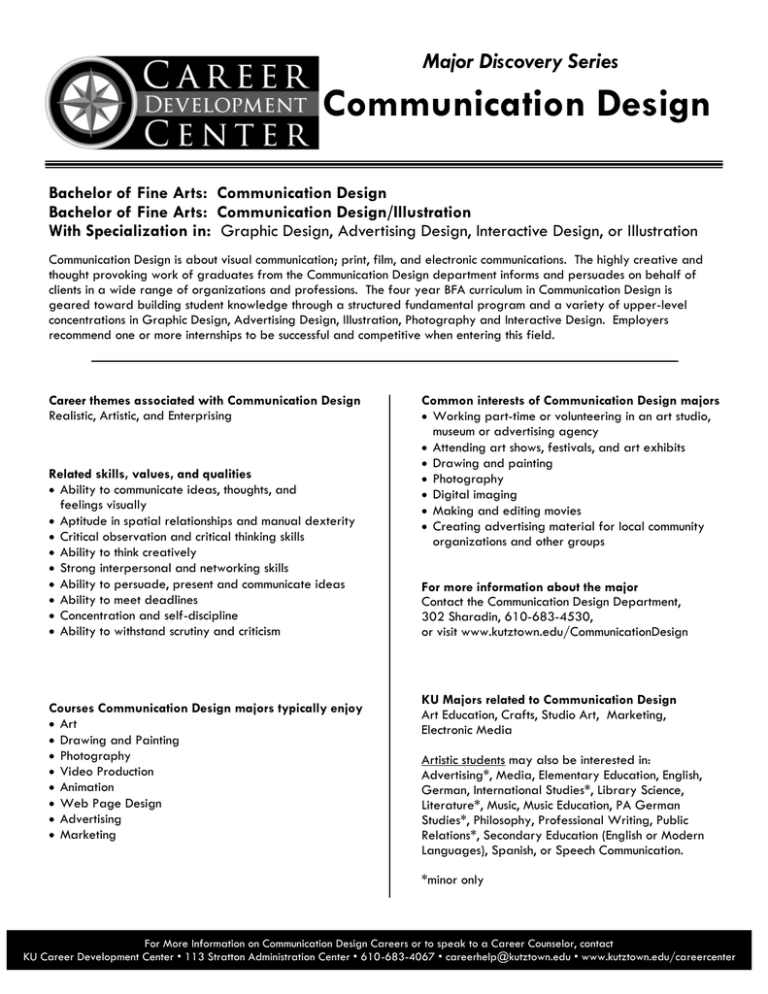
Major Discovery Series Communication Design Bachelor of Fine Arts: Communication Design Bachelor of Fine Arts: Communication Design/Illustration With Specialization in: Graphic Design, Advertising Design, Interactive Design, or Illustration Communication Design is about visual communication; print, film, and electronic communications. The highly creative and thought provoking work of graduates from the Communication Design department informs and persuades on behalf of clients in a wide range of organizations and professions. The four year BFA curriculum in Communication Design is geared toward building student knowledge through a structured fundamental program and a variety of upper-level concentrations in Graphic Design, Advertising Design, Illustration, Photography and Interactive Design. Employers recommend one or more internships to be successful and competitive when entering this field. Career themes associated with Communication Design Realistic, Artistic, and Enterprising Related skills, values, and qualities Ability to communicate ideas, thoughts, and feelings visually Aptitude in spatial relationships and manual dexterity Critical observation and critical thinking skills Ability to think creatively Strong interpersonal and networking skills Ability to persuade, present and communicate ideas Ability to meet deadlines Concentration and self-discipline Ability to withstand scrutiny and criticism Courses Communication Design majors typically enjoy Art Drawing and Painting Photography Video Production Animation Web Page Design Advertising Marketing Common interests of Communication Design majors Working part-time or volunteering in an art studio, museum or advertising agency Attending art shows, festivals, and art exhibits Drawing and painting Photography Digital imaging Making and editing movies Creating advertising material for local community organizations and other groups For more information about the major Contact the Communication Design Department, 302 Sharadin, 610-683-4530, or visit www.kutztown.edu/CommunicationDesign KU Majors related to Communication Design Art Education, Crafts, Studio Art, Marketing, Electronic Media Artistic students may also be interested in: Advertising*, Media, Elementary Education, English, German, International Studies*, Library Science, Literature*, Music, Music Education, PA German Studies*, Philosophy, Professional Writing, Public Relations*, Secondary Education (English or Modern Languages), Spanish, or Speech Communication. *minor only For More Information on Communication Design Careers or to speak to a Career Counselor, contact KU Career Development Center • 113 Stratton Administration Center • 610-683-4067 • careerhelp@kutztown.edu • www.kutztown.edu/careercenter Attend your senior kick-off and other info sessions to prepare for job search/grad school. Enroll in the Career Success Update your resume and Certificate. LinkedIn profile. Complete an internship and/or Meet with CDC career Create cover letter drafts. undergraduate research. coach. Enroll in the Career Gain experience through Attend info sessions about Attend info sessions to learn Exploration Certificate. internships and/or internships, interviewing, job about resume writing, and Attend info sessions to learn undergraduate research. search strategies, and grad externships. about career development Secure references for job/grad school. Confirm your choice of major and personal branding. school applications. Build a LinkedIn profile and and consider options for Take a career assessment to continue to monitor your online Create your “30 second” double major or minor. identify and confirm interests. commercial. presence. Research careers of interest. Get involved in campus clubs Meet with CDC to develop Complete a mock interview. Complete a job shadowing and organizations. job search strategies. Build skills through research (externship) experience. Develop basic workplace skills Research employers. projects, part-time employment, through jobs or volunteer work. Seek meaningful employand volunteer work. Network with professionals ment or volunteer work in a Talk with professors, family, through events and social Participate in Coffee and field related to your major. and friends about career media. Convos & networking programs. Explore options for underideas. Join a professional organization Attend internship & job fairs. graduate research and Conduct informational in your discipline. Take on a leadership role in a study abroad. interviews with professionals Attend the senior etiquette student organization or work. Write a resume and have it working in fields of interest. dinner. Consider graduate school reviewed by the CDC. Develop a relationship with Participate in job fairs and options and prepare for Manage your online your professors and faculty on-campus interviewing. admissions tests. presence. advisor. Sample Career Titles Communication Design majors can be found working in a wide variety of career fields. Here are just some career titles that may be of interest. Please note that some jobs may require further education and training. Advertising Artist Aerial Photographer Animator Art Administrator Art Consultant Art Director Art Educator Artist’s Agent CD/Record Cover Designer Creative Director Designer Display Designer Freelance Designer Freelance Illustrator Fashion Artist/Designer Gallery Owner Graphic Arts Technician Greeting Card Artist Illustrator Label Designer Landscape Architect Magazine Designer/Illustrator Motion Picture Artist Motion Picture Scenic Designer Municipal Graphic Designer Newspaper Layout Artist Photographer Product Designer/Illustrator Set Designer/Illustrator Web Designer To learn more about these careers, visit http://online.onetcenter.org or www.bls.gov/oco. Common Internship sites and Employers Communication Design majors often find internships and employment in the following fields/industries. Photo Studios Art Studios Advertising Agencies Webpage Companies Graphic Design Studios Motion Picture Studios Schools/Camps Interior Design Firms Media Production Companies Community Arts Organizations Magazines/Newspapers Photo Agencies & Studios Publishing Firms KU Career Network is the primary online resource for preparing and connecting students and alumni with employers. www.kutztown.edu/KUCN Useful Websites for Communication Design Majors Whether you are researching related career fields, applying for internships or jobs, or planning to join a professional association, these websites are for you! Industry/Employment Information Job/Internship Search Boards Professional Associations National Endowment for the Arts www.nea.gov Greater Phila Cultural Alliance www.philaculture.org/jobbank College Art Association www.collegeart.org NY Foundation for the Arts www.nyfa.org Interior Design Jobs www.interiordesignjobs.com Southern Graphics Council http://sgcinternational.org ResArtis www.resartis.org Internships Www.Internships.com Assoc. for the Advancement of Art www.aaae.org Art Deadline http://artdeadline.com Aquent Talent Agency www.aquent.com Nat’l Assoc. of Independent Artists http://naia-artists.org/ Professional Artist Magazine www.artcalendar.org HireSkills www.hireskills.com Society of American Graphic Artists http://saga.monmouth.edu Graphic Arts & Printing Career Guide www.khake.com/page27.html Communication Arts www.creativehotlist.com American Association of Advertising Agencies www.aaaa.org Recognition in Advertising www.oneclub.org American Institute of Graphic Arts www.aiga.org Building Your Resume for a Career in Communication Design Building a strong resume for your career field starts long before you ever start your job search. Employers want to hire graduates who not only have the necessary educational background but also have experience applying that knowledge to real life situations. Take note of the skills and knowledge obtained through your educational background and hands-on experiences. Highlight transferable skills such as communication and technological proficiencies. Learn more about your field and develop the necessary skills for employment by gaining hands-on experience through externships, internships, part-time jobs and related volunteer positions. Develop professionally through campus involvement and professional memberships. This illustrates responsibility, leadership abilities and time management skills.
